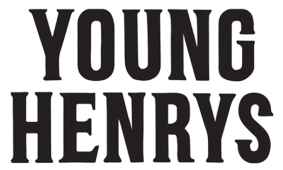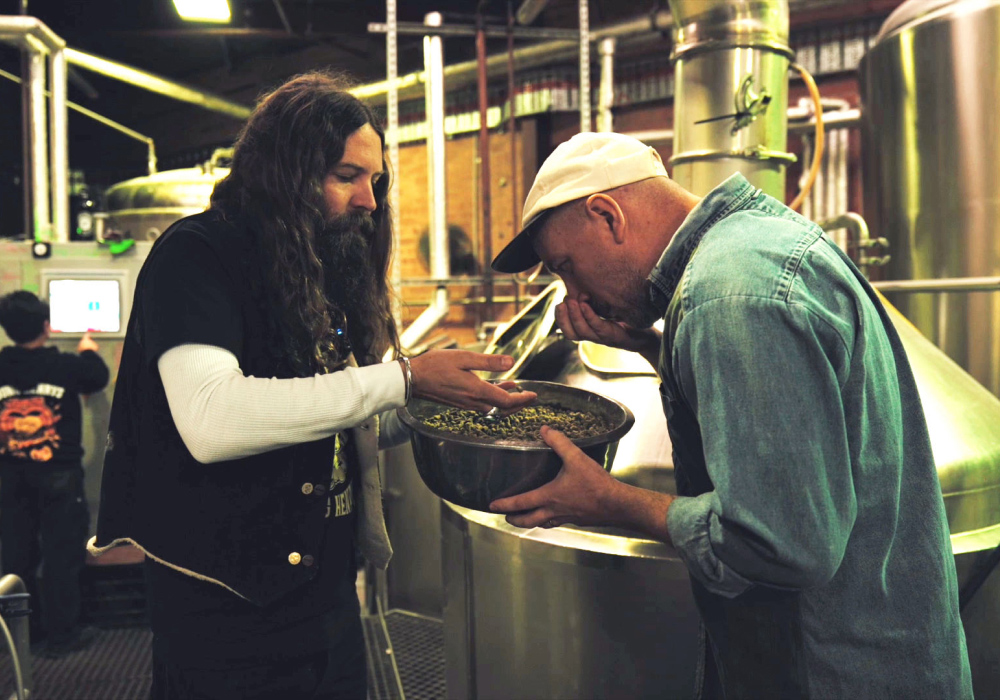Young Henrys on Beyond The Pass
An O.G. craft brewery that puts as much thought into what they put into their community as what they put into their brews.
In this episode, Oscar McMahon (Founder & Director of Young Henrys) and Graeme Alexander (Lightspeed’s Hospo Oracle) talk craft beer, sustainability, renewable energy, the live music community and Sandra Bullock movies, as well as brewing up a batch of Young Henrys famous Newtowner Pale Ale.


Who are they?
Brewery & distillery
What do they do?
Brew beer, make gin, save the planet
Since when?
2012

Over a decade strong
Over the past 10 years, Oscar McMahon and the Young Henrys team have cemented themselves as one of the heavy hitters in the Australian craft beer scene.
From its genesis as an idea between friends in the back room of a pub, to its early days in a single section of the space they call home to this day, Young Henrys has earned its stripes.

But instead of resting on their laurels, Young Henrys continues to look to the future, not just in a business sense, but in a much grander scheme.
With community-owned solar powering their brewery, and a collaborative science experiment squeezing every last bit of usable product from their waste, it’s fair to say Young Henrys is making the right moves to ensure there’s a future for everybody.

It all starts with malted barley grains
"Sort of in between beer and cereal—beereal!"
In the loudest closet in the world, malted barley grains are milled in preparation for being spun around in water heated to around 60 degrees. This converts the starches within the grains into sugar, specifically maltose. This makes things fermentable, a very important property to have if you want to brew, well, anything! Once enough of this fermentable, sugary mixture is made, it’s passed through an enormous hydraulic press to squeeze out all of the good stuff and it’s then boiled at around 101 degrees into a terrifying, hot Weetbix-smelling, sticky mess.

Next come the hops
"It’s hot! It’s so hot!"
The hot Weetbix lava is pulled from ‘the kettle’ into ‘the whirlpool’ where it’s spun onto itself, over and over again. This is where the hops are added and where the beer gets its flavour. For Newtowner, this means a familiar passionfruit-like taste. But be warned, metal bowls containing hops are excellent thermal conductors and gloves are highly recommended when dumping hops into 101 degree, spinning liquid.

A final dose of yeast
"I’d hate to actually have to brew something!"
The hoppy, maltosey (is that a word?) mixture is pulled from the whirlpool, through a heat exchange to cool things down a little before adding the yeast because, although yeast likes a little heat, like us humans, 101 degrees is a touch warm for its liking. The whole batch is then pulled into an enormous tank to ferment and become beautiful, wonderful Newtowner Australian Pale Ale, ready to be canned, kegged and bottled, delivered to your waiting mouths.

Pioneering sustainability for all breweries
"For a bunch of died-in-the-wool Inner Westies, sustainability is pretty up there."
Young Henrys likes wastage, but not in any sinister, everyone for themselves kind of way. No, they like their wastage because of the opportunity it gives them to create good.
The spent grains from the brewing process are sent to feed livestock, but it’s the CO₂ that interests them more.

In collaboration with UTS, Young Henrys is pioneering a method in which the excess CO₂ created when they brew is fed to micro algae, who then feed off it and transform it into oxygen. The micro algae is then sold as a food additive for cattle to help reduce their methane emissions.
Plus, it glows bright green like we always wished every science experiment would.

About the beer
"It all started in the back room of a pub."
Young Henrys can trace its roots to a fabled beer appreciation club. Co-founders Oscar McMahon and Richard Adamson held ambitions to start a beer company that was as in touch with beer drinkers as their beer club was, and so Young Henrys was born.
Since then, Young Henrys has expanded to offer not only a constantly-evolving beer selection, but an award winning gin: The Noble Cut.

“We like making things, we like new challenges."
“We thought it’d be a great idea to create a gin that was using hops in it as well. We’ve just recently done a G&T tinny which is probably the most-drunk thing at YH barbecues.”

A collaborative beer company
"We’re a beer company, of course we’re going to make beer!"
Young Henrys makes beer. I know that, you know that, everybody knows that.
That’s precisely why Oscar and the team at Young Henrys like a collaboration. It’s an opportunity for them to work with others (most often musicians) and create something great out of the creative friction that occurs.

“Collaboration is a really interesting tool when used well. You’re actually forcing yourself to be creative, not just to your own standards, but to someone else’s.”
This also gives them the opportunity to not have to talk about beer all of the time—that’s what everybody else does.
“Just making a beer and saying hey, drink this beer. It’s too one-dimensional. You’re a beer company, of course you’re going to make a beer. Tell me something more interesting!”